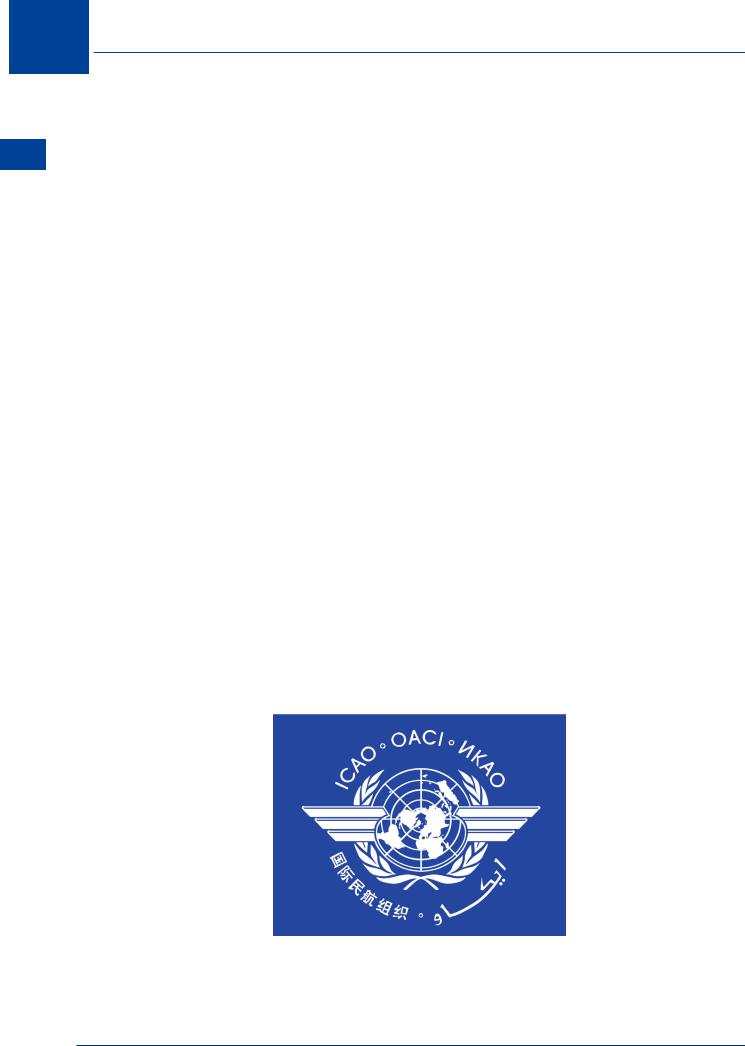
- •Textbook Series
- •Contents
- •1 Definitions
- •Introduction
- •Abbreviations
- •Definitions
- •2 International Agreements and Organizations
- •The Chicago Convention
- •International Law
- •Commercial Considerations
- •Customs and Excise, and Immigration
- •International Obligations of Contracted States
- •Duties of ICAO Member States
- •Status of Annex Components
- •The International Civil Aviation Organization (ICAO)
- •The Organization of ICAO
- •Regional Structure of ICAO
- •Regional Structure and Offices
- •ICAO Publications
- •Other International Agreements
- •The Conventions of Tokyo, the Hague and Montreal
- •The Warsaw Convention
- •The Rome Convention
- •IATA
- •ECAC
- •EASA
- •Eurocontrol
- •World Trade Organization
- •Geneva Convention
- •EU Regulation 261/2004
- •Questions
- •Answers
- •3 Airworthiness of Aircraft
- •Introduction
- •Airworthiness
- •Questions
- •Answers
- •4 Aircraft Nationality and Registration Marks
- •Introduction
- •Nationality and Registration Marks
- •Certification of Registration
- •Aircraft Markings
- •Classification of Aircraft
- •Questions
- •Answers
- •5 Flight Crew Licensing
- •Introduction
- •Definitions
- •General Rules Concerning Licensing
- •Licences and Ratings for Pilots
- •Multi-crew Pilot Licence (MPL)
- •Instrument Rating (Aeroplane) (IR(A))
- •Instructor and Examiner Rating
- •JAR-FCL 3 Medical Requirements
- •Pilot Proficiency
- •EASA Theoretical Knowledge Examinations
- •Questions
- •Answers
- •6 Rules of the Air
- •History
- •Applicability of the Rules of the Air
- •General Rules
- •Visual Flight Rules
- •Instrument Flight Rules
- •Semi-circular Flight Level Rules and RVSM
- •Special VFR
- •Distress and Urgency Signals
- •Restricted, Prohibited or Danger Areas
- •Signals for Aerodrome Traffic
- •Marshalling Signals
- •Flight Deck Signals
- •Questions
- •Answers
- •Instrument Procedures
- •PANS OPS
- •Instrument Departure Procedures
- •Questions
- •Answers
- •8 Approach Procedures
- •Procedure Basics
- •Approach Procedure Design
- •Obstacle Clearance Altitude/Height
- •Operating Minima
- •Descent Gradients
- •Track Reversal and Racetracks
- •Missed Approach Segment and Procedure
- •Published Information
- •RNAV Approach Procedures based on VOR/DME
- •Questions
- •Answers
- •9 Circling Approach
- •Circling Approach
- •Questions
- •Answers
- •10 Holding Procedures
- •Holding Procedures
- •Entry Sectors
- •ATC Considerations
- •Obstacle Clearance
- •Questions
- •Answers
- •11 Altimeter Setting Procedure
- •Altimeter Setting Objectives
- •Transition
- •Phases of Flight
- •Questions
- •Answers
- •12 Parallel or Near-parallel Runway Operation
- •Safety
- •Runway Spacing
- •Questions
- •Answers
- •13 SSR and ACAS
- •Airborne Collision Avoidance System (ACAS)
- •Questions
- •Answers
- •14 Airspace
- •Introduction
- •Control Areas and Zones
- •Classes of Airspace
- •Required Navigation Performance (RNP)
- •Airways and ATS Routes
- •Questions
- •Answers
- •15 Air Traffic Services
- •Introduction
- •Air Traffic Control
- •ATC Clearances
- •Control of Persons and Vehicles at Aerodromes
- •The Flight Information Service
- •The Alerting Service
- •Procedures
- •Questions
- •Answers
- •16 Separation
- •Concept of Separation
- •Vertical Separation
- •Horizontal Separation
- •Radar Separation
- •Procedural Wake Turbulence Separation
- •Radar Wake Turbulence Separation
- •Visual Separation in the Vicinity of Aerodromes
- •Stacking
- •Questions
- •Answers
- •17 Control of Aircraft
- •Procedural ATC
- •Radar Control
- •Radar Identification
- •Radar Service
- •Aerodrome Control
- •Approach Control Service
- •Air Traffic Advisory Service
- •Aircraft Emergencies
- •Questions
- •Answers
- •18 Aeronautical Information Service (AIS)
- •Introduction
- •General
- •The Integrated Aeronautical Information Package
- •The Aeronautical Information Publication (AIP)
- •Notices to Airmen (NOTAM)
- •SNOWTAM
- •ASHTAM
- •Aeronautical Information Circulars (AICs)
- •Pre-flight and Post-flight Information
- •Questions
- •Answers
- •Introduction
- •Aerodrome Reference Code
- •Glossary of Terms
- •Aerodrome Data
- •Runways
- •Taxiways
- •Aprons
- •Questions
- •Answers
- •Requirements
- •Visual Aids for Navigation
- •Runway Markings
- •Taxiway Markings
- •Signs
- •Markers
- •Visual Docking Guidance Systems
- •Questions
- •Answers
- •21 Aerodrome Lighting
- •Aerodrome Lights
- •Approach Lighting Systems
- •Runway Lighting
- •Taxiway Lighting
- •Questions
- •Answers
- •22 Obstacle Marking and Aerodrome Services
- •Introduction
- •Visual Aids for Denoting Obstacles
- •Visual Aids for Denoting Restricted Use Areas
- •Emergency and Other Services
- •Other Aerodrome Services
- •Questions
- •Answers
- •23 Facilitation
- •Entry and Departure of Aircraft
- •Questions
- •Answers
- •24 Search and Rescue
- •Definitions and Abbreviations
- •Establishment and Provision of SAR Service
- •Co-operation between States
- •Operating Procedures
- •Questions
- •Answers
- •25 Security
- •Introduction
- •Objectives
- •Organization
- •Preventative Security Measures
- •Management of Response to Acts of Unlawful Interference
- •Further Security Information
- •Questions
- •Answers
- •26 Aircraft Accident and Incident Investigation
- •Introduction
- •Objective of Investigation
- •Investigations
- •Serious Incidents
- •EU Considerations
- •Questions
- •Answers
- •27 Revision Questions
- •Revision Questions
- •Answers
- •EASA Specimen Examination
- •Answers to Specimen EASA Examination
- •28 Addendum – EASA Part-FCL & Part-MED
- •Chapter Five. Flight Crew Licensing
- •European Aviation Safety Agency (EASA)
- •Licences
- •Ratings
- •Certificates
- •EASA Part-MED
- •29 Index

International Agreements and Organizations |
|
2 |
|
Commercial Considerations |
|||
|
|
||
2.11 International Civil Aviation. A matter to which the Chicago Conference attached great |
2 |
||
importance was the question of exchange of commercial rights in international civil aviation. |
|
Organizations |
|
The States addressed the subject, resulting in Contracting States agreeing, bilaterally, to grant |
|
||
|
|
||
each other certain rights regarding the commercial exploitation of civil aviation. These rights |
|
|
|
are now known as the Freedoms of the Air. The freedoms give rights to transit the airspace of |
|
|
|
Contracting States to scheduled flights. |
|
and |
|
|
|
||
2.12 Bilateral Agreements. Due to political and national rivalries, it was not found possible |
|
Agreements |
|
|
|
||
to reach a single agreement satisfactory to all 52 States, therefore two supplementary bilateral |
|
|
|
agreements were set up which gave each State the opportunity to enter into agreements with |
|
International |
|
other States on a ‘one-to-one’ basis if considered desirable between those States: |
|
||
|
|
||
2.13 The International Air Services Transit Agreement permits aircraft of a signatory State |
|
|
|
to fly over, or land for technical reasons in, the territory of another signatory State; |
|
|
|
2.14 The International Air Transport Agreement allows the carriage of traffic between |
|
|
|
the State of Registration and another signatory State. (Traffic: the carriage of mail, cargo or |
|
|
|
passengers). |
|
|
|
2.15 Definitions. The following definitions are required knowledge. |
|
|
|
2.16 Scheduled flight is a flight, for which agreement has been reached between |
|
|
|
States (at government level), concerning the schedule. For instance, how many flights |
|
|
|
would be allowed in any period, what aerodromes could be used, what time of day |
|
|
|
the flights would be allowed, and what reciprocal arrangements would be required. A |
|
|
|
State is not obliged to grant permission for an operator to operate a schedule. |
|
|
|
2.17 Non-scheduled flights are those to which a schedule is not attached. i.e. one-off |
|
|
|
flights or charter flights that are not flown on a regular basis. It is an embodiment of |
|
|
|
the freedoms that a State cannot refuse, on political or economic grounds, to accept a |
|
|
|
non-scheduled flight. |
|
|
|
2.18 Cabotage. Cabotage is defined as the transport of goods or passengers |
|
|
|
between two points in the same country by a vessel or aircraft registered in another |
|
|
|
country or State. Most countries refuse cabotage. However, an EU State may not refuse |
|
|
|
cabotage by another EU State. |
|
|
|
Customs and Excise, and Immigration
2.19 Facilitation. Under international law the imposition of customs tariffs and the prohibition of the importation of proscribed items, is allowed. In order to allow Contracting States to maintain national Customs and Excise regulations, international flights are required to make the first point of landing in a Contracting State at a recognized international airport which provides customs, health and immigration facilities. (In the UK these are known as customs airports). Within the EU the removal of restrictions to free trade now allows flights from one EU State to another to make the first point of landing at a non-customs aerodrome providing certain rules are observed. These rules are explored in the section of this manual concerning Facilitation. Other rules apply to immigration.
25

2 |
|
International Agreements and Organizations |
|
International Obligations of Contracted States |
|||
|
|
||
2 |
|
2.20 National and ‘International’ Law. In becoming an ICAO Contracting State, states agree |
|
International |
to observe the International Standards specified by ICAO. From the standards, the international |
||
territory and airspace (through national law). Article 38 of the Chicago Convention requires |
|||
|
|
rules and regulations governing civil aviation are drawn. By accepting contracted status, each |
|
|
|
state accepts the responsibility for enforcement of the rules and regulations within its sovereign |
|
Agreements |
each Sovereign State to notify ICAO of any differences between their national regulations and |
||
the International Standards adopted. Furthermore States are to publish these differences in |
|||
|
|
||
|
|
their national Aeronautical Information Publication (AIP). Thus a situation is recognized where |
|
and |
national legislation and regulations have precedent over international rules within the territorial |
||
airspace of that State. Where flights are conducted over the high seas, the international rules |
|||
Organizations |
|||
passengers. Other regulations are established to facilitate the smooth and expeditious flow of |
|||
|
|
apply without exception. The International (ICAO) Rules of the Air are promulgated (Annex |
|
|
|
2) to standardize the procedures for civil aviation specifically for the safety of aircrew and |
|
|
|
air traffic by the adoption of Standards and Recommended Practices (SARPs). |
|
|
|
2.21 Right to Prosecute Offenders. Where an offence is committed in an aeroplane contrary |
|
|
|
to the ‘international’ law, the state, in whose airspace the offence occurs, has the right to try |
|
|
|
and punish offenders. If the offence occurs over ‘the high seas’ the state of registration of |
|
|
|
the aircraft has the right to prosecute the offender(s). Note: The international agreements |
|
|
|
oblige states to prosecute. If a state does not want to (for political reasons) another state may |
|
|
|
do so. For instance: A bomb is placed on an American aeroplane (contrary to the Montreal |
|
|
|
Convention and Protocols) by 2 Libyans, in Frankfurt or Rome. The aeroplane explodes over |
|
|
|
Scotland. Who has the power to prosecute? The order is as follows: |
|
•The UK (under Scottish law) – the offence happened over Scotland
•The United States – the aeroplane was registered in the USA
•The Italians – because the bomb was placed on board in Rome
•The Germans – because the aeroplane made an intermediate stop in Frankfurt
•Any other state, the citizens of which were killed or injured
•Libya – because the suspects are Libyan
Note: If the UK had not prosecuted, the US most certainly would have.
2.22Search and Rescue. In accepting Contracted State status, each State specifically undertakes to provide procedures and facilities for Search and Rescue (SAR) within the territory of that State. The provision of SAR services in areas of high seas, and areas of undetermined sovereignty, will be established on the basis of Regional Air Navigation (RAN) agreements. The standards governing the provision of SAR services oblige the State to provide at least the minimum service compatible with the type and frequency of the air traffic using the airspace for which the State is responsible, and that service is to be available 24 hours per day. The requirement also imposes upon the State the need to maintain a degree of co-operation with adjacent States and the readiness to assist with SAR operations if requested.
2.23Conditions to be fulfilled with respect to aircraft as stipulated by the Chicago Convention.
a.Documents to be carried in aircraft. Every aircraft engaged in international navigation shall carry the following documents :
1.Certificate of Registration
2.Certificate of Airworthiness
3.Crew member licences
4.Journey Logbook
26

International Agreements and Organizations |
|
2 |
|
||
|
|
|
5.Aircraft radio station licence - if equipped with a radio
6.If passengers are carried, a list of names and place of both embarkation and destination
7.If cargo is carried, a manifest and detailed declaration of the cargo
b.Cargo restrictions. No munitions of war may be carried in or above the territory of a State without the permission of that State
c.Photographic apparatus. Each Contracting State may prohibit or regulate the use of photographic apparatus in an aircraft over its territory.
Duties of ICAO Member States
2.24Standards and Recommended Practices (SARPs). The stated aim of the Convention on International Civil Aviation and subsequently the aims of ICAO are to ensure safety, regularity and efficiency of international civil aviation operations. In order to achieve this, the Contracting States are required to comply with the Standards and Recommended Practices (SARPs). There are 18 annexes to the Convention. The SARPs are established after consultation with the Contracting States and interested international organizations, finalized by the ICAO Air Navigation Commission and submitted to the Council where a two-thirds majority is required for adoption. The SARPs are considered binding on Contracting States but if a State finds it impossible to implement the SARPs, it must inform ICAO under the terms of Article 38 of any differences that will exist on the applicability date of the amendment. Such differences will be detailed in the national aeronautical information publication (AIP) and summarized in a supplement to each annex of the Chicago Convention.
2.25Customs Duty and Excise. ICAO has addressed taxation in the field of international aviation and Member States are required to follow the resolutions and recommendation of the Council in this respect. States are asked to exempt fuel, lubricants, and other technical consumables taken on an aircraft in a State other than the State of registry, providing such supplies are for consumption in flight. Also to reduce or eliminate taxes on international air transport (fares) and to grant, reciprocally to air transport enterprises of other States, exemption from taxation on income and profits. Within the area of customs duty and excise charges, Annex 9 (Facilitation) requires states to apply procedures, which allow expeditious handling of goods and cargo intended for import or which are passing through. The establishment of ‘free zones’ is encouraged.
2.26 Aircraft Certificates, Registration and Licences. Annex 7 (Aircraft Nationality and Registration Markings) requires Contracting States to apply standard procedures for registration. It includes the format of registration marks and nationality symbols, including the size and where these are to be displayed on aircraft. The annex also calls for the registration of all aircraft and provides a sample of a certificate of registration for use by States. Annex 8 (Airworthiness of Aircraft) requires States to provide a Certificate of Airworthiness, for each registered aircraft, declaring that the aircraft is fit to fly. Under the terms of Annex 1 (Personnel Licensing), SARPs are established requiring each State to apply standardization in the licensing of personnel involved in international aviation including flight crew members (pilots, flight engineers), air traffic controllers and maintenance technicians. The overriding purpose of such standardization is to ensure that all involved in air transport operations are licensed to common standards and able to operate throughout the world, thus generating greater trust in aviation on the part of the traveller. A licence issued by the authority in one State is not automatically valid in another State. In this instance, the annex requires States to establish procedures for the validation of licences issued in other States and defines the method by which such validation shall be annotated.
International Agreements and Organizations 2
27

2 International Agreements and Organizations
Organizations and Agreements International 2
2.27Carriage of Dangerous Cargo. More than half the cargo carried by all modes of transport in the world is classified as dangerous. Because of the speed advantages of air transport, a great deal of this cargo is carried by aircraft. In Annex 18 (The Safe Transport of Dangerous Goods by Air), States are required to accept the SARPs associated with the carriage of dangerous goods and to implement the Technical Instructions for the Safe Transport of Dangerous Goods by Air.
2.28Searching of aircraft. Contracting States have the right, without unreasonable delay, to search aircraft of another Contracting State on landing or departure. They also have the right to inspect the certificates and other documents prescribed by the Chicago Convention
Status of Annex Components
2.29Definition. An annex is made up of the following component parts, not all of which are necessarily found in every annex. They have the status indicated:
2.30Standards and Recommended Practices (SARPs) are adopted by the Council and are considered binding upon all Contracting States unless a state has notified a ‘difference’ as defined under article 38 of the convention. SARPs defined thus:
2.31 A Standard is any specification for physical characteristics, configuration, materiel, performance, personnel or procedure, the uniform application of which is recognized as necessary for the safety or regularity of international air navigation and to which Contracting States will conform in accordance with the Convention. In the event of impossibility of compliance, notification to the Council is compulsory under article 38 of the Convention.
2.32 A Recommended Practice is any specification for physical characteristics, configuration, materiel, performance, personnel or procedure, the uniform application of which is recognized as desirable in the interest of safety, regularity or efficiency of international air navigation and to which Contracting States will endeavour to conform in accordance with the Convention.
The International Civil Aviation Organization (ICAO)
2.33 Status. ICAO, created by the Chicago Convention, is an inter-governmental organization, which has become a specialized agency in relationship with the United Nations. The headquarters of ICAO is in Montreal and it provides the machinery to achieve standardization and agreement
28
